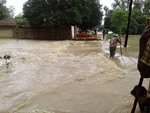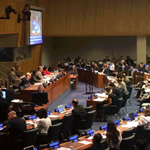Social Watch E-Newsletter - Issue 311 - September 1, 2017
Published on Fri, 2017-09-01 00:00
| Issue 311 - September 1, 2017 |
|
Social Watch reports
Spotlight report on the 2030 Agenda
|
|
|
| |
|
| |
Downsizing social expenditures in Hungary?
|
| |
|
| |
When Hungarian government officials talk about implementing the SDGs they mean less public expenditure in social sectors. Between 2010 and 2015 the Orbán government on the one hand increased state expenditures, doubled spending on the economy, and significantly increased spending by allocating about US$ 340 million annually on sports, mainly for building football stadiums. On the other hand, it decreased expenditures on public health, education and pensions. The government did not save only on pensioners, but also on unemployment benefits, by decreasing their size and duration even when they were taking place on an insurance basis. These measures decreased annual family support expenditures as well, which can be explained by a decrease in the number of children and the decades-long freeze in services. Social benefits were decreased, while extreme poverty increased over the past eight years. Read more
|
| |
|
| |
|
| |
PPPs are incompatible with good public services in Nepal
|
| |
|
| |
 |
Nepal has faced one socioeconomic shock after another in a relatively short period of time, be it the ten- year civil war or the devastating earthquake or the unstable government, which has changed 25 times since the restoration of democracy in 1990.
At the end of 2015, the government introduced the Public Private Partnership (PPP) policy followed by trainings and programmes emphasizing the need for private investment to finance public services, especially for the SDGs. The ultimate need of private entities to maximize profits in order to stay in business is fundamentally incompatible with protecting the environment and ensuring universal access to quality public services. This is evident in the failure of Kathmandu Upatyaka Khanepani Ltd. (KUKL), the first PPP scheme in 2008, to deliver its promise to improve the water delivery efficiency around Kathmandu Valley. High water tariffs, undersupply of water and high deficits also shows the inefficiency of the board, chaired by the representative from a private sector, along with KUKL. Read more
|
| |
|
| |
Social Watch publishes country reports 2017
Social Watch coalitions around the world are contributing their assessments and reports to the global Social Watch report 2017 on the national implementation of the 2030 Agenda in its first year. Stalled, or slipping back, is the theme that appears in many of the contributions. Natural and un-natural disasters, some of them of catastrophic proportions, appear again and again not just as an obstacle to faster progress towards the agreed goals, but in fact setting the clock back. Part of the reason for lack of progress has to do with an over-reliance on public-private partnerships, urged by the World Bank as a way to finance implementation of the SDGs.
The Social Watch national platforms are independent coalitions of civil society organizations struggling for social and gender justice in their own countries. The Social Watch network has been publishing since 1996 yearly reports on how governments implement their international commitments to eradicate poverty and achieve equality between women and men.
|
| |
|
| |
|
| |
|
| |
 |
At the 2017 HLPF, Jordan became the third country from the Arab region to participate in the VNR process; following Egypt and Morocco in the 2016 review. The first words of Jordan’s national report made reference to the same issues: ‘the power of working together’ and taking into consideration ‘the urgent world issues’. Yet, as in many parts of the world, the Arab region lags behind in the implementation of the Agenda 2030; structural challenges on social, economic and political levels continue and inequalities continue to widen. The Arab NGO delegates to the UN review of national reports consider that the Arab States "lack road maps for implementation and are still trying to identify ways and means to integrate the three pillars of Sustainable Development in their institutional structures, national plans, and budgets". As the Ministerial Declaration adopted at HLPF reaffirms, the pace of implementation must be accelerated. Read more
|
|
| |
|
| |
|
| |
Growing global interdependence poses greater challenges to policymakers on a wide range of issues and for countries at all levels of development.
Yet, the new mechanisms and arrangements put in place over the past four decades have not been adequate to the growing challenges of coherence and coordination of global economic policymaking. Recent financial crises have exposed some such gaps and weaknesses.
Although sometimes seemingly slow, the United Nations (UN) has long had a clear advantage in driving legitimate discussion on reform because of its more inclusive and open governance, argues Jomo Kwame Sundaram, former United Nations Assistant Secretary-General for Economic Development. Read more
|
|
| |
|
|
|
| |
SOCIAL WATCH IS AN INTERNATIONAL NGO WATCHDOG NETWORK MONITORING POVERTY ERADICATION AND GENDER EQUALITY Social Watch >>
Social Watch E-Newsletter For comments, sugestions, collaborations contact us at: socwatch@socialwatch.orgTo stop receiving this newsletter send a message with the subject "unsubscribe" to: socwatch@socialwatch.org |
|
|
|
